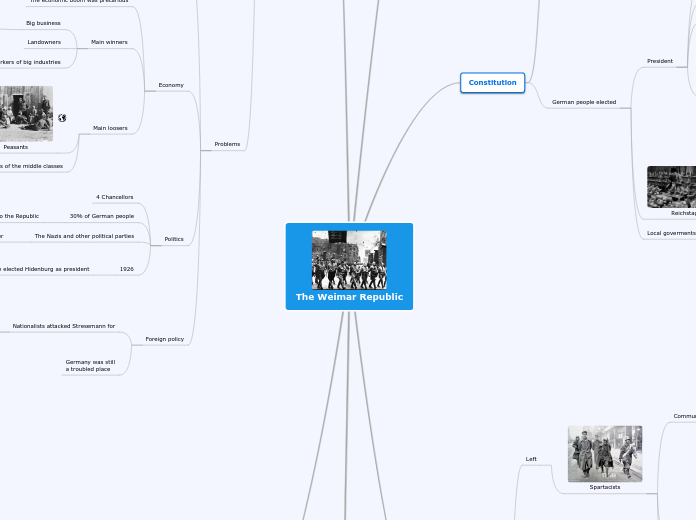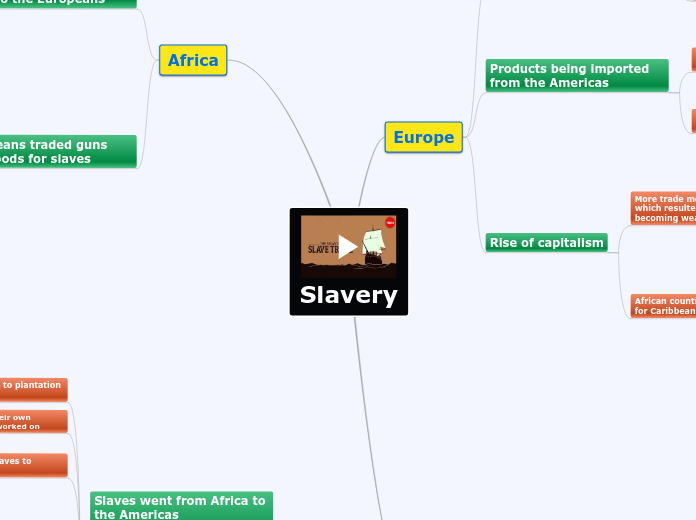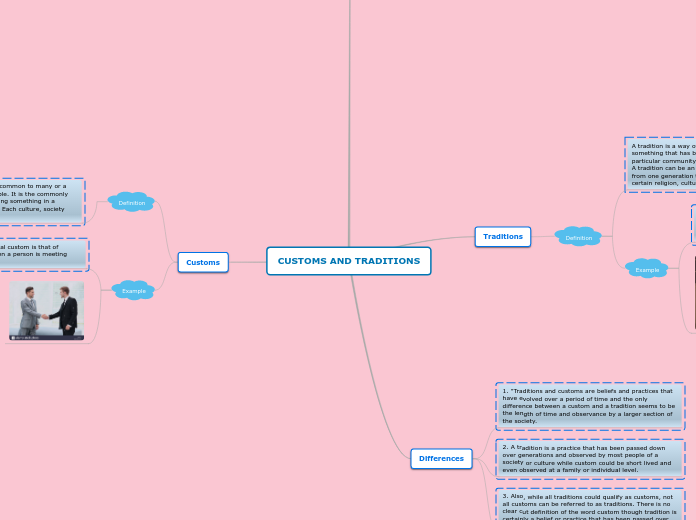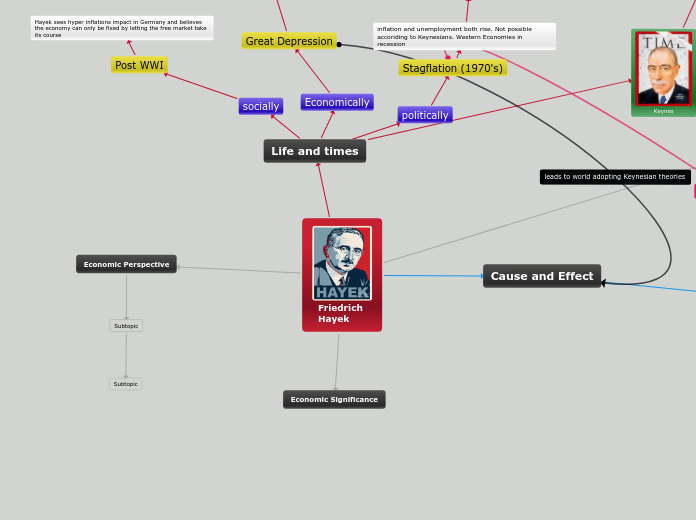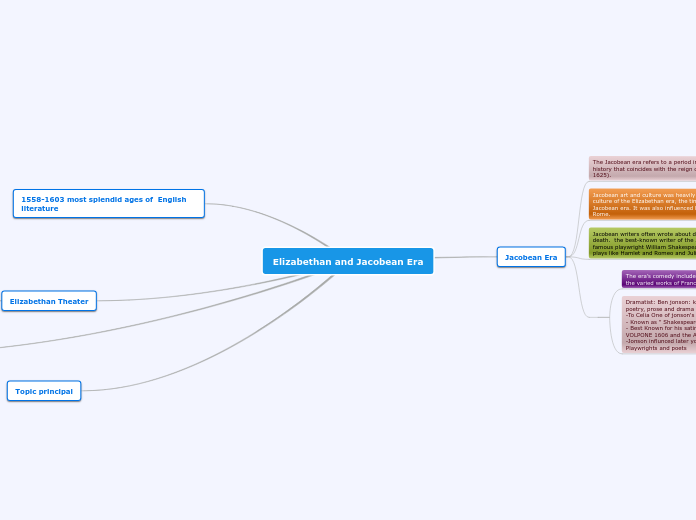The Weimar Republic
It caused an economic disaster
Germany could not pay the
reparations the second year
France and Belgium
entered the Ruhr area
Thet started taking products
Ebert told workers to stop
production to solve this
Collapse in german industries
France and Belgium
reacted harshly
Many workers were killed
It was legal according to the
Treaty of Versailles
Full of industries
inside Rhineland
Army was not allowed
Destabilised Germany politically
and economically
Germany lost
was obliged to
Pay reparations to all the Allies
€6.000 million
accept the blame for starting the war
Lost its air force
THe navy and army were reduced
16% of coal industry
48% of iron industry
12,5% of its population
All of its overseas colonies
10% of its territory
May 1919
big crisis
Freikorps and most
people were furious
Ebert was blamed for
betraying the country
He could not go back to war
he had no choice
It was announced
Hyperinflation
The situation needed
URGENT ACTION
Hyperinflation damaged politically
the Weimar republic
Government lost support of middle classes
August of 1923
Stressman took over
EConomic crisis was solved quickly
Renegotiated pay reparations
Continued production in the Ruhr
Replaced worthless marks with RETENMARKS
Germany had no
goods to trade or sell
Government started
printing money
Bad consequences
Most affected
Middle-class families
with SAVINGS
The money they had saved
lost so much value that
1923
A loaf of bread
1921
A house
Prices could rise
in less than an hour
Peole realised that the
money was worthless
Prices and salaries rocketed
They could pay
Debts/war loans etc.
It seemed to be
a good solution
Stresemann
Problems
Germany was still
a troubled place
Nationalists attacked Stresemann for
signing the Locarno Treaties
joining the League of Nations
It meant Germany
accepted the Treaty of Versailles
German people elected Hidenburg as president
opposed to democracy
followed Kaiser ideas
The Nazis and other political parties
were gaining power
30% of German people
voted parties opposed to the Republic
4 Chancellors
Main loosers
Sections of the middle classes
Peasants
Overproduction in peacetime
Main winners
Workers of big industries
Landowners
Big business
Chemical and steel industries
The economic boom was precarious
People from
German villages
believed
culture of cities representad
a MORAL DECLINE
Wandervogel movement
Return to simple country values
Countryside
Achievements
Politics
No more attempted revolutions
Germany became more stable
Foreign policy
1929
He negotiated the Young Plan
removed british, french and Belgium troops
From Rhineland
lightened reparation prices
1926
was accepted in the League of Nations
Stresemann wanted to reverse
some terms of the Treaty of Versailles
He signed the Locarno Treaties in 1925
Determined western borders
with
Belgium
France
Economy
In 1928
Germany reached the same level
of production than before the war (1913)
became the 2nd world's greatest industrial power
behind USA
He signed the Dawes plan
Asked American loans
for the
Technology
Industries
Business
These facilities
Higher standard of living
Provided jobs
Public work
Reparations payment in a longer period
He built up German PROSPERITY again
He was Right-winger
wider support
He was a more skillful politician than Ebert
Culture
revival in Germany
Weimar republic
freedom
artists
writers
poets
singers
flourished
powerful paintings
Critisized politicians, business men, church and army leaders
Design and architecture
developed
golden age of
german cinema
people started going to clubs
Opposition
Leader
Kapp
rebellion
he asks help to the German people
industrial workers of Berlin
General strike
Kapp realises he can't
with it and goes
NO water or transport
Ebert could not ask help to
the army
Germany to have
Powerful industry
Empire
Expasion of territory
Strong army
Kaiser dictatorial style of government
People who had grown in the succesful
They refused to
Losses of territory and industries
Restrictions of the army
Treaty of Versailles
Kaiser days
Punishment was different for it section
Right
went to cour but
Judges had been appointed by the Kaiser
gave them more tolerant punishments
For example Hitler (was given a not severe punishment
after all he had done)
shorter prison sentences
not so stricts
were from the right
hardly punished by jugdes
Left
Spartacists
Leaders
Were killed in a revolution
Karl Liebknecht
Roxa Luxemburg
Old Bolsheviks
Communists
Remained as a
Powerful and anti-goverment force
wanted
Communist revolution
Ebert was afraid
ask help
Freikorps
They crushed revolts
1919
Communist declared a soviet republic
Barvaria's leader was killed
Rebellion
Paramilitar and vigilante
anti-communist group
Germany might go the same way as Russia
NO democracy
Germany ruled by worker councils and soviets
Constitution
German people elected
Local goverments
which were 17
Reichstag
President
appointed to
Chancellor
needed support of the Reichstag
appointed to the government ministers
day to day government
Prime minister
Judeges (court)
Armed forces
Emergency powers
International work
head of the sate
Proportional representation in the Reichstag
attempted to set up
most democratic syste in the world
no individual could have much power
Origin
1918
9th of November of 1918
10th of November of 1918
Friedrich Ebert
Promised
Better working conditons
Freedom of speech and worship
Signed an armistice with the allies
End the war
Became the new leader
German republic
Kaiser abdicated his throne
Allies had clearly won
offered peace under strict conditions
Kaiser should abdicate
Socialists led uprisings of
Soldiers
Kaiser refused
Germany had to be more democratic
They met in Weimar
Berlin was destroyed
small city
